Wuzhen Theatre Festival turns three
Performers, patrons flock the annual event
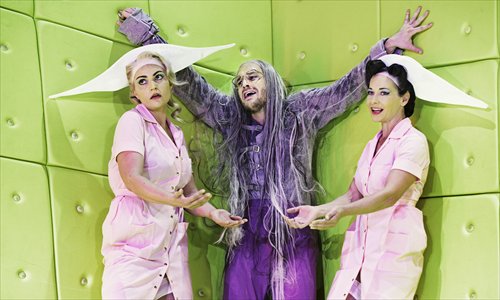
A scene from The Physicists, the German comic play that opened the festival
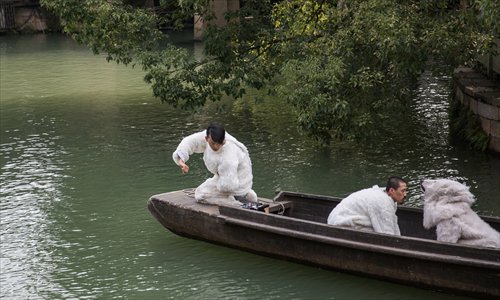
Guangzhou-based Er Gao Production performs dance theater on water at the Wuzhen Theatre Festival in Zhejiang Province. Photo: Courtesy of the Wuzhen Theatre Festival
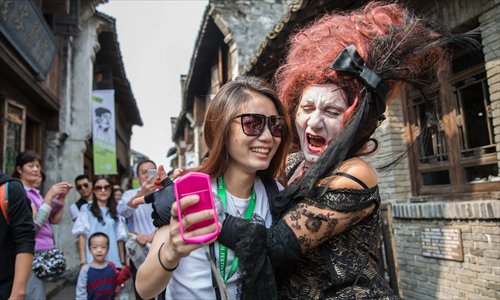
Artists from around the world give free performances in the lanes and on the banks at Wuzhen
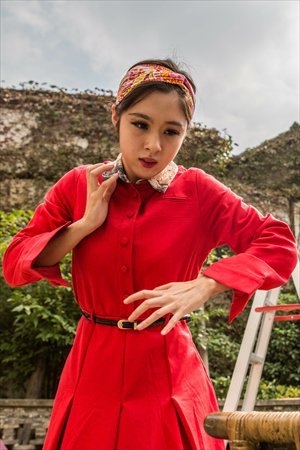
Artists from around the world give free performances in the lanes and on the banks at Wuzhen
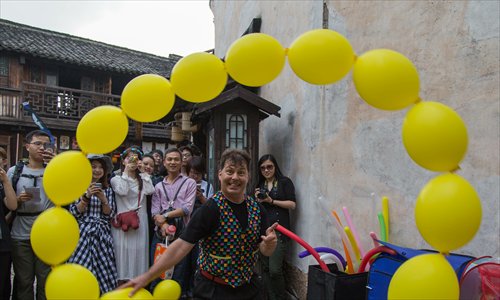
Artists from around the world give free performances in the lanes and on the banks at Wuzhen
"Chinese have a saying that one can see how his adulthood could be when he is still three years old. The Wuzhen Theatre Festival celebrates its third anniversary this year, and I hope people can see it has a good disposition and embodies good energy," said Meng Jinghui, the new artistic director of the festival, at Wuzhen, a national top-level scenic zone in Zhejiang Province.
On October 15, the third Wuzhen Theatre Festival kicked off with German director Herbert Fritsch's colorful and comic play The Physicists. The show, which highlighted complex body movements and vocal mimicry, distinguished itself from previous years' opening shows and underlined a distinctive innovative spirit for this year.
Initiated by China's top theater talents in 2013, the festival biennially changes its artistic director. Meng, a renowned experimental theater master with notable works such as Rhinoceros in Love and Two Dogs' Opinions on Life, takes up the position after Taiwanese playwright and director Stan Lai, credited by BBC as one of the best playwrights in the Chinese world.
The town is much busier than the last two years, with a larger number of theater productions and outdoor carnival events.
A total of 73 performances from 20 invited production companies - half from China and a half from abroad - will be shown at the seven indoor theaters and several alfresco theaters until October 24. More than 100 free street performances take place daily in the lanes and on the banks among visitors in the town.
A Mecca for artists
The 303 Drama Club from Chongqing is one of these street performers. It traveled to Wuzhen to compete with 11 other theater groups selected from 160 applicants to vie for an award in the Young Theatre Artist's Competition.
On October 16, during the first of three sessions in the competition, the 303 Drama Club presented a costume drama that integrated Sichuan opera with modern theater. Seated in the audience, among the jury members, were the renowned actor and director Huang Lei and playwright and critic Shi Hang. The winner of the Best Play in the competition will be awarded 200,000 yuan ($31,500.)
"The competing productions are much better in quality than those of last year," said Chen Xi, manager of the 303 Drama Club, who had visited the festival as a spectator last year.
"More theatrical styles are seen this year, such as Peking Opera and multimedia theater. There are also very competitive actors and very good scripts with great dramatic tension, from which we can learn a lot."
Chen also told the Global Times that she and her theater members already regard Wuzhen as a holy place for theater talents, because they can meet the most accomplished theater masters in China and from around the world. They said the theater festival, which is supervised by theater professionals rather than government officials or commercial brands, is the fairest and most professional of its kind in China.
"Coming to the festival is like a pilgrimage for us young people," said Chen, who was born in the 1980s.
According to the official website of the theater festival, last year the scenic zone drew 130,000 visitors during the festival, of that number 24,419 went to the theater. The overall tourist flow for last year was about 7 million, and this year the figure is expected to reach 9 million, according to Shao Yun, a consultant for the scenic spot.
Wuzhen used to be a place that celebrated traditional Chinese operas such as Yueju, Huju, and shadow play, but at the end of 1990s the town was almost empty as most of the young residents went to work in the cities causing the theater culture to gradually fade away.
Experimental soul
The ancient town of Wuzhen was developed as a scenic spot in 2001, under the direction of Chen Xianghong, who later invited Huang Lei, Stan Lai and Meng Jinghui to create the theater festival. As a result of their efforts, visitors to Wuzhen can appreciate not only traditional Chinese operas but also the latest contemporary theater productions from China and abroad.
Like always, almost all of the theater tickets were sold out before the festival started this year. The third festival goes really far in introducing to audiences experimental theaters from around the world.
A Man who Flies up to the Sky, the other play opened on October 15 by Chinese director Li Jianjun, resembled a piece of contemporary performance art with its non-verbal scenes and non-linear plot. Body theater Oleg! Oleg! Oleg! from the Netherlands innovatively narrated a profound story about the human condition through only three actors. While Chinese interactive play Heat Up unfolded a spontaneous show to standing audiences in an illusive environment rendered by multimedia devices.
Such pioneering practices in theater, which serves as a tribute to Meng Jinghui's vision in dramatic arts, have won accolades. But at the same time they have fueled discussions as to whether they are too experimental for audiences to understand. Meng told the Information Times that such talk was what he had expected, and it would be great if the discussion would further spur communication and confrontation between artistic ideas.
The Wuzhen Theater Festival is often compared to the Edinburgh Festival Fringe in Britain and the Avignon Theater Festival in France, even though its co-founders said they did not refer to any foreign festivals when planning the festival. The Festival has undoubtedly become a fast-growing and top-class theater festival in China. It has tripled the number of invited plays since its debut year, and to ensure its operation it has a service team of 3,000 people for the artists and visitors. There will be six more theaters next year.
Just as Stan Lai, executive chairman of the festival, expected, Wuzhen will become a window, through which Chinese audiences can see foreign plays and foreign audiences can get to know more about Chinese theater.